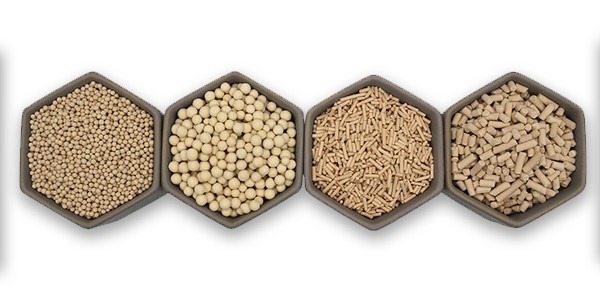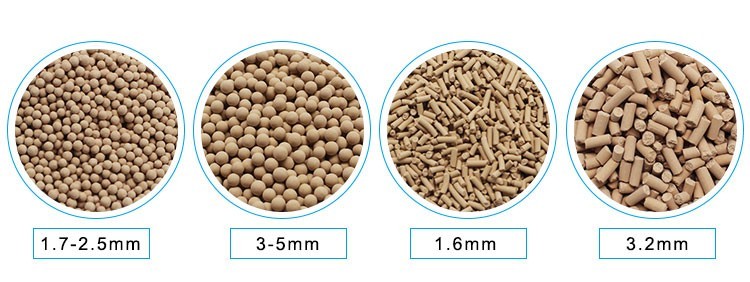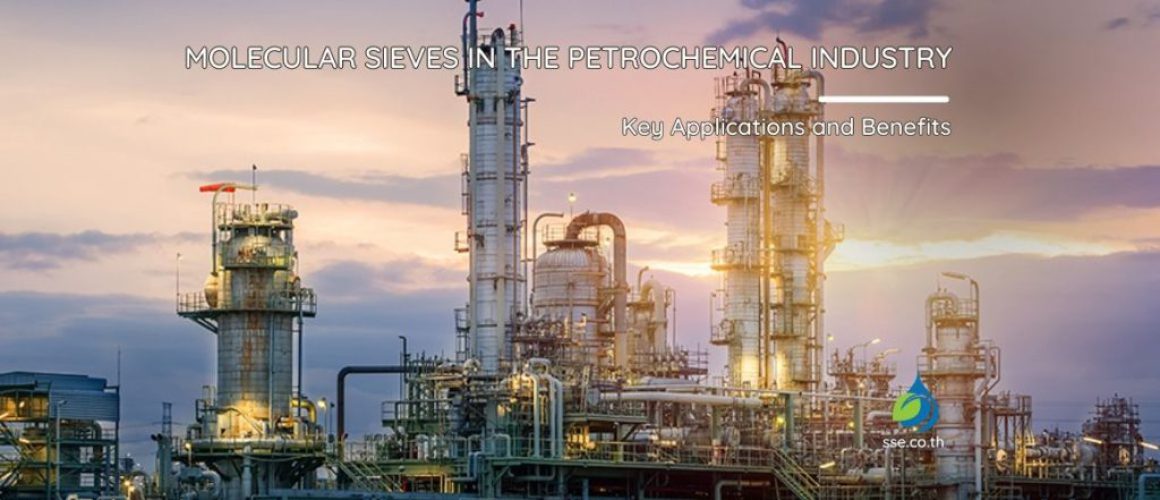Molecular Sieves in the Petrochemical Industry


| Feature | Description |
|---|---|
| Industry Application | Used extensively in the petrochemical industry for gas purification, separation, and drying. |
| Efficiency | High adsorption capacity makes it effective in purifying and refining processes. |
| Versatility | Suitable for a wide range of petrochemical applications including hydrocarbon separation and refining. |
| Product Links | Find more about our molecular sieve products here. |
Table of Contents
“Molecular sieves are the backbone of efficient gas purification, enabling the petrochemical industry to achieve the highest standards of purity in gases like CO2 and H2S, ultimately leading to cleaner and more efficient production processes.”
Introduction
Molecular sieves play a critical role in the petrochemical industry, where they are used to improve efficiency and purity across a range of processes, including gas purification, hydrocarbon separation, and drying. By enabling precise separation and adsorption, molecular sieves help petrochemical producers meet both quality and environmental standards. For a foundational understanding of their versatility, visit Your Comprehensive Guide to Molecular Sieves.
Molecular Sieves: A Quick Recap
| Property | Description |
| Pore Size | 10 angstroms, suitable for adsorbing larger molecules that are common in petrochemical industries. |
| Composition | Made from sodium aluminosilicate, giving it excellent adsorption properties for industrial uses. |
| Form | Available as beads or pellets, with sizes tailored for specific petrochemical applications. |
| Regeneration | Can be regenerated by heating, allowing for repeated use and cost efficiency. |
Molecular sieves are highly porous, crystalline materials made from either natural or synthetic zeolites. These materials contain a vast network of interconnected pores of uniform size, which allow them to selectively adsorb molecules based on their size and shape. The most common molecular sieve types are 3A, 4A, 5A, and 13X, each with different pore sizes and adsorption properties, making them suitable for various applications. For a deeper look at how these sieves function, see How Molecular Sieves Work.


Applications of Molecular Sieves in the Petrochemical Industry
Molecular sieves are integral to many core petrochemical processes, enabling the selective adsorption, separation, and purification of gases, liquids, and hydrocarbons. Their versatility ensures they are widely applied across refining, separation, and purification stages, contributing to higher product quality, improved efficiency, and reduced costs.
| Application | Description |
| Gas Purification | Removes CO2, H2S, and moisture from gas streams, ensuring purity of gases used in petrochemical processing. |
| Hydrocarbon Separation | Used for separating straight-chain hydrocarbons from branched ones, improving refining processes. |
| Drying Processes | Highly effective in drying liquids and gases, which is crucial for the quality of petrochemical products. |
| Catalyst Support | Supports catalytic reactions by providing a stable, porous environment for catalysts in reactors. |
Ethylene and Propylene Production
Ethylene and propylene, foundational feedstocks in the petrochemical industry, undergo rigorous purification and drying to ensure high purity for downstream processes like polymerization and chemical synthesis. Molecular sieves excel in drying and purifying these olefins by selectively adsorbing moisture and impurities that could degrade catalyst performance. This critical function reduces production costs and enhances product yields. For more on achieving precision in olefin processing, see Optimizing Gas Purity.


Catalyst Support and Protection
Catalysts are essential in many petrochemical reactions, requiring protection from contaminants to maintain their efficiency and lifespan. Molecular sieves, especially 13X, provide a stable environment for catalysts, adsorbing impurities that can hinder reaction processes. By mitigating catalyst contamination, molecular sieves reduce the frequency of catalyst regeneration or replacement, enhancing process efficiency and lowering operational costs. For more information, explore Molecular Sieve 13X Catalyst Support.
Hydrocarbon Separation and Purification
In hydrocarbon separation, molecular sieves target specific hydrocarbons based on their molecular size, making them ideal for isolating compounds like isomers or purifying feedstocks. Applications include:
- Separating paraffins from isoparaffins for fuel quality improvement.
- Purifying aromatics to ensure high-grade outputs.
- Removing unsaturated from saturated hydrocarbons, contributing to higher process efficiency and better product yields.
Learn more about the role of molecular sieves in Hydrocarbon Separation and Refining.
Gas Dehydration
The removal of water from natural gas and other gases is critical to avoid corrosion, hydrate formation, and efficiency losses. Molecular sieves are highly effective in gas dehydration, offering a lower-energy alternative to conventional methods. They operate efficiently under lower pressures and temperatures, and their robust regeneration capacity adds to their cost-effectiveness. For more on this application, see Desiccant for Compressed Air Systems.
Other Petrochemical Applications
Molecular sieves play a vital role in additional petrochemical applications, such as:
- CO₂ removal from natural gas: Essential for enhancing gas quality and reducing corrosive risks.
- Hydrogen purification: Ensuring high purity for downstream processes.
- Sulfur compound removal: Preventing catalyst poisoning and improving fuel quality.
For targeted adsorption strategies, particularly for VOC, ammonia, or sulfur compounds, visit Adsorption Solutions with Molecular Sieves.
Oxygen and Nitrogen Separation
High-purity oxygen and nitrogen are critical in petrochemical processes, including combustion, oxidation, and inerting. Molecular sieves facilitate cost-effective, energy-efficient production of these gases through Pressure Swing Adsorption (PSA) and Vacuum Swing Adsorption (VSA), reducing reliance on cryogenic distillation. For a deeper understanding, check The Science of PSA Oxygen Concentration.
Removal of Contaminants from Liquid Streams
Molecular sieves efficiently remove impurities like water, acids, and corrosive compounds from solvents, glycols, and oils, maintaining the quality and performance of these liquids in petrochemical processes. This application helps prevent corrosion, degradation, and reduced process efficiency, especially in environments where feedstock purity is essential for high yields and stable operation. Visit Regeneration and Reuse of Molecular Sieves for details on maximizing molecular sieve longevity in such applications.
Benefits of Molecular Sieves in the Petrochemical Industry
| Advantage | Description |
| High Selectivity | Able to selectively adsorb specific molecules, making it effective for targeted purification tasks. |
| Operational Stability | Offers stable performance under a range of pressures and temperatures typical in petrochemical processes. |
| Reusable | Can be regenerated multiple times, reducing operational costs and environmental waste. |
| Versatility | Suitable for a variety of applications across different segments of the petrochemical industry. |
The use of molecular sieves in the petrochemical industry offers several key benefits, including:
High Selectivity and Efficiency
Molecular sieves are highly selective adsorbents, allowing them to effectively separate and purify various components in petrochemical processes. This high selectivity translates into improved product yields, better process efficiency, and reduced energy consumption.
Regenerability and Reusability
One of the main advantages of molecular sieves is their ability to be regenerated and reused multiple times without significant loss of adsorption capacity. This feature makes them a cost-effective option for various petrochemical applications, as it reduces the need for frequent replacement of adsorbent materials.
Regenerating molecular sieves after saturation is a cost-effective approach that extends their usability while maintaining adsorption efficiency. Heat, vacuum, or pressure variations are commonly used to release adsorbed molecules and prepare the sieves for reuse. This feature makes molecular sieves both environmentally friendly and economical, as they reduce waste and operational costs. For detailed steps on regeneration, see Regeneration and Reuse of Molecular Sieves.
Operational Stability and Resistance to Contaminants
Molecular sieves exhibit excellent operational stability and resistance to contaminants, such as acids, alkalis, and other corrosive substances. This property makes them suitable for use in challenging petrochemical environments, where they can maintain their adsorption performance and contribute to improved process efficiency and product quality.
Environmental and Economic Benefits
Molecular sieves contribute positively to environmental sustainability in the petrochemical industry by reducing energy consumption and limiting emissions. Their high adsorption efficiency enables processes that are both cost-effective and eco-friendly, as they reduce the need for chemical treatments and lower waste generation. Discover more about their sustainable role in The Environmental Impact of Molecular Sieves.
| Feature | Description |
| Industry Application | Used extensively in the petrochemical industry for gas purification, separation, and drying. |
| Efficiency | High adsorption capacity makes it effective in purifying and refining processes. |
| Versatility | Suitable for a wide range of petrochemical applications including hydrocarbon separation and refining. |
| Product Links | Find more about our molecular sieve products here. |
Future Innovations in Molecular Sieve Technology
Ongoing advancements in molecular sieve technology aim to enhance durability, adsorption rates, and selectivity, catering to the growing demand for high-purity products in petrochemicals. New materials and hybrid sieve designs are being researched to support more complex separations and higher thermal stability. For updates on these innovations, visit Advances in Molecular Sieve Technology and Research.
Frequently Asked Questions
What are molecular sieves?
Molecular sieves are highly porous, crystalline materials known as zeolites. They have a regular pore structure that allows them to selectively adsorb molecules based on their size and shape, making them effective in various separation and purification processes.
How do molecular sieves work?
Molecular sieves work through a process called adsorption, where molecules are selectively trapped within the pores of the molecular sieve based on their size, shape, and polarity. The sieve’s pore size and structure determine which molecules can be adsorbed and separated from a mixture of substances.
What are the key applications of molecular sieves in the petrochemical industry?
In the petrochemical industry, molecular sieves are used for drying and purifying hydrocarbon streams, removing contaminants from liquid streams, catalyst support and protection, and separation of gases such as ethylene, propylene, oxygen, and nitrogen.
What are the benefits of using molecular sieves in the petrochemical industry?
Molecular sieves offer several benefits, including high selectivity and efficiency, regenerability and reusability, operational stability and resistance to contaminants, and environmental and economic advantages.
What are the different types of molecular sieves used in the petrochemical industry?
The main types of molecular sieves used in the petrochemical industry include 3A, 4A, 5A, and 13X. These types differ in pore size, structure, and adsorption properties, making them suitable for various applications.
How are molecular sieves regenerated and reused?
Molecular sieves can be regenerated and reused by heating them to a specific temperature to remove the adsorbed molecules. This process, called desorption, restores the adsorption capacity of the molecular sieve, allowing it to be used multiple times without significant loss in performance.
What are the environmental benefits of using molecular sieves in the petrochemical industry?
The use of molecular sieves in the petrochemical industry can lead to reduced energy consumption, lower emissions, and minimized waste generation. Additionally, their regenerability and reusability help reduce operational costs and resource consumption.
“With their unique ability to adsorb larger hydrocarbon molecules, molecular sieves play a pivotal role in refining operations, making them indispensable for improving both the quality and sustainability of petrochemical products.”
Conclusion
Molecular sieves are a versatile and effective solution for various applications in the petrochemical industry. Their high selectivity, efficiency, and operational stability make them a preferred choice for separation, purification, and drying processes. By leveraging the benefits of molecular sieves, the petrochemical industry can improve process efficiency, product quality, and environmental performance, ultimately contributing to a more sustainable and profitable operation.
To understand the fundamentals of how molecular sieves work, check out our detailed explanation here. If you’re interested in learning about their applications in other industries, such as pharmaceuticals, you can read more at Molecular Sieves in the Pharmaceutical Industry and Molecular Sieves in the Food and Beverage Industry. For a broader overview of molecular sieves, visit Your Comprehensive Guide to Molecular Sieves.
Related Reading: Learn more about the differences between moisture removal and end-of-life management in our guide Drying vs. Disposing: Choosing the Right R22 refrigerant adsorbent.
For more technical details and applications, you can also explore the Wikipedia entry on Molecular Sieves. Additionally, browse our product offerings to find the right molecular sieve for your needs here.
ขอบคุณที่ใช้เวลาอ่านบทความของเราเกี่ยวกับการป้องกันความชื้น ทางเราหวังว่าท่านจะได้รับข้อมูลที่มีคุณค่าและเป็นประโยชน์ ทางเรายินดีให้บริการการปรึกษาฟรีเพื่อพูดคุยเกี่ยวกับความต้องการของท่านและให้คำแนะนำเกี่ยวกับวิธีการป้องกันความชื้นที่กำหนดเฉพาะสำหรับคุณ โปรดติดต่อเราที่ 0858124188 เพื่อนัดหมายการปรึกษาหรือเยี่ยมชมร้านค้าของเราเพื่อค้นหาผลิตภัณฑ์ที่ช่วยป้องกันสินค้าของคุณจากความเสียหายจากความชื้น ทางเราหวังว่าจะได้รับข่าวสารจากท่านเร็วๆนี้
